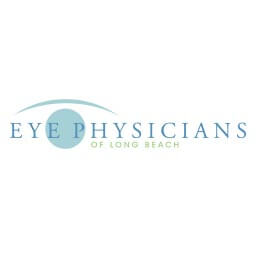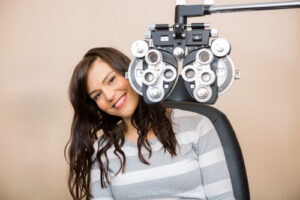Blog post by: Eye Physicians of Long Beach

Are you wondering if LASIK could be right for you? It’s a vision correction procedure that corrects astigmatism, nearsightedness, and farsightedness.
Many patients can eliminate or reduce their need to wear glasses and contacts after having LASIK. Another benefit of this life-changing procedure is you’ll have sharper vision. But, because LASIK is a surgical procedure, it’s not a good fit for everyone.
The ophthalmologists at the Eye Physicians of Long Beach consider various factors when deciding if someone is a good candidate for LASIK or not. Keep reading for 13 signs you may want to consider LASIK!

1. Chronic Seasonal Allergies
Severe seasonal allergies during the spring can result in uncomfortable symptoms like watery, red, itchy eyes. Unfortunately, people who wear contacts may experience severe eye irritation due to seasonal allergies.
During allergy season, pollen spreads everywhere, including on your hands and clothes. And wearing contact lenses means touching your eyes frequently when you put in or take out your contacts.
This increases the chances of pollen getting into your eyes. When that happens, your eyes can become quite irritated.
While LASIK doesn’t treat the symptoms of seasonal allergies, it does remove a key reason you have for touching your eyes during allergy season. After having LASIK, you’ll no longer need to wear contact lenses, reducing the endless cycle of putting in contacts and taking them out.
If you can prevent allergens and irritants from getting in your eyes, why wouldn’t you? LASIK can considerably improve your eye comfort if you have allergies because you’ll no longer need to wear contact lenses.

2. You’re Feeling Self-Conscious
If you don’t like how you look when wearing glasses and feel self-conscious, LASIK can help you feel more comfortable in your skin, boosting your self-confidence.
It may sound small, but many people hate how they look in their glasses. LASIK can give you the ability to feel more comfortable and even love who you see in the mirror.
3. Working Environment
It may be impractical to wear prescription glasses in physical or dynamic work environments like the kitchen or outdoors. For instance, if you’re a chef whose face is constantly covered with cooking steam or a landscaper who has to deal with mud and soil, it makes sense to have LASIK.
Glasses can get in your way or could even become dangerous if they fall off and you can’t see.

4. Healthy Eyes
If you don’t suffer from dry eye syndrome, eye infections, injuries, and diseases, LASIK can be a great alternative to prescription eyewear. Eye diseases can include herpes, retinal diseases, keratoconus, severe cataracts, uncontrolled glaucoma, or corneal conditions.
You should also see your ophthalmologist about LASIK if you don’t have any active or residual eye issues, like some instances of strabismus and lazy eye, as well optic neuritis.

5. You’re Tired of Wearing Prescription Glasses or Contact Lenses
Everyone who wears eyeglasses knows how frustrating it can be when their glasses get foggy in cold or rainy weather. Although glasses help you see well, they can be inconvenient.
And when it comes to contacts, there is the hassle that comes with putting them in and taking them out every day. It’s no accident that LASIK has an over 96% success rate with patients who have had the procedure!
Most people end up with 20/20 vision or better after having LASIK. What’s not to love about a clear vision that you can enjoy for decades?

6. You’re 18 Years and Older
If you’re at least 18 years or older, you may be a suitable candidate for the vision correction procedure. At this age, your vision has stabilized, and this is one of the hallmarks of an ideal LASIK candidate.
Also, the FDA only approved LASIK (Food and Drug Administration) for those 18 years and older.

7. You’re in Good Health
You’re a good candidate for LASIK if you’re in good health. You don’t need to be in perfect health, but you can’t have any autoimmune conditions that will make it harder to recover after a procedure like LASIK.
This includes things like lupus, Sjogren’s syndrome, or rheumatoid arthritis. These diseases can prevent your eyes from healing correctly after having LASIK surgery.

8. Medications
Before you can have LASIK, you must disclose all medications you currently take during your LASIK consultation. Make sure to tell your eye doctor your complete medical history to give them the best understanding of your health history.
9. Your Prescription Falls Within the Treatable Limits
If your prescription is within the ideal treatable limits, you can qualify for LASIK. If your prescription is too high due to refractive errors, the outcomes during LASIK become less predictable.
Severe nearsightedness could require removing too much corneal tissue, increasing the risk of vision complications.
10. You’re Not Pregnant, Nursing, or Planning to Become Pregnant
If you are not pregnant, nursing, or planning on becoming pregnant in the next six months, you may be a good LASIK candidate. The hormone fluctuations that occur while you’re pregnant or nursing can affect your vision stability, and if you have LASIK surgery, it will most likely be ineffective.
11. Adequate Corneal Thickness
Having adequate corneal tissue will ensure the success of LASIK. During your consultation, your ophthalmologist will measure the depth of your cornea to assess whether you can have the procedure performed safely.
If your corneas are too thin, having LASIK can become unsafe and may lead to severe visual complications. With thinner corneas, you may be a better candidate for a procedure like PRK, which your ophthalmologist can discuss with you.

12. Stable Prescription
LASIK is suitable for a patient with a stable prescription that hasn’t changed in at least a year or more. Your ophthalmologist will confirm if your eyes have remained stable for at least a year before performing the procedure.
13. You’re Well-Informed and Have Realistic Expectations
As with any surgery, it’s crucial to have an accurate picture of the possibilities of LASIK before the procedure and have realistic expectations about the outcomes. The fact is, your results will depend on your unique eyes and your refractive errors.
There are no guarantees when you get LASIK. There may still be limitations that even a LASIK procedure can’t correct. Knowing this ahead of having your LASIK consultation is essential if you have any interest in undergoing LASIK.
Better, More Comfortable Vision After LASIK
If you suffer from allergies or are tired of wearing glasses or contact lenses, LASIK can help you enjoy clearer vision and alleviate the unpleasant symptoms of allergies.
Schedule your LASIK consultation at Eye Physicians of Long Beach if you’d like to discuss LASIK and learn more about the procedure. Why wait if clearer vision could be yours?
